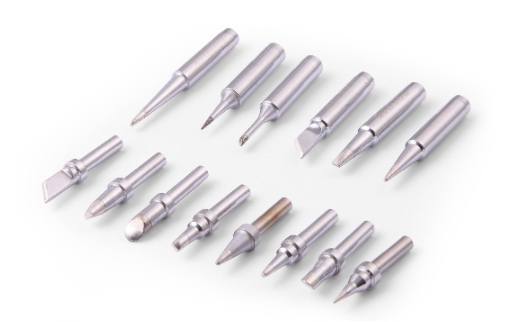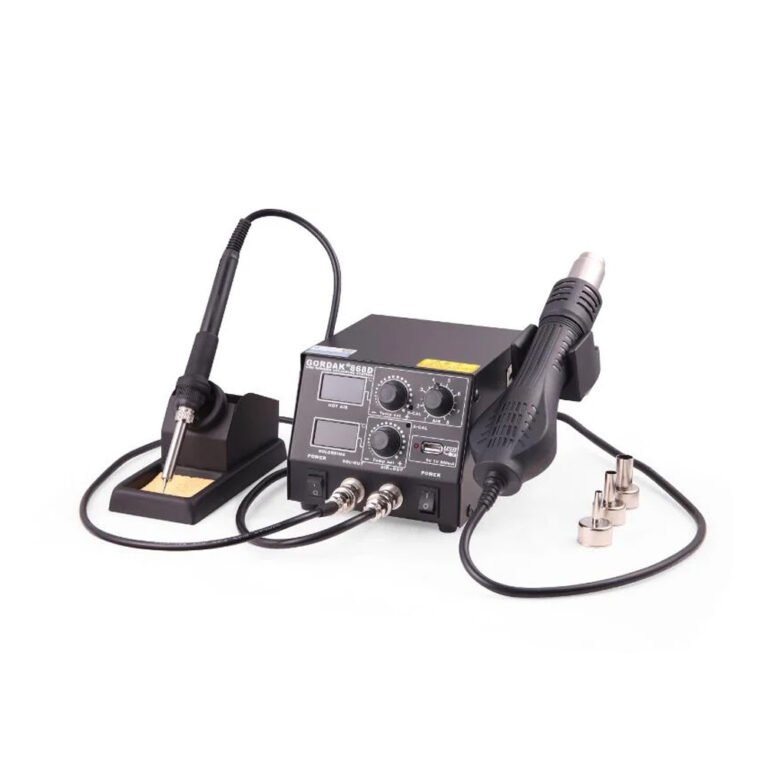When it comes to electronics soldering, the soldering tip is just as important as the soldering station itself. Using the wrong tip can lead to poor solder joints, damaged components, or unnecessary frustration. For precision work—such as soldering SMD components, microelectronics, or fine-pitch ICs—the choice of tip makes all the difference.
1. Why the Soldering Tip Matters
The soldering tip is the point of contact between your iron and the component. It directly affects:
- Heat transfer efficiency
- Accuracy of soldering
- Quality of solder joints
- Durability of the tool
Choosing the right tip ensures clean, reliable work while protecting delicate parts from overheating.
2. Common Types of Soldering Tips for Precision
| Tip Type | Shape | Best For |
|---|---|---|
| Conical Tip | Pointed end | General precision work, fine wires, small pads |
| Chisel Tip | Flat edge | Wider heat transfer, good for drag soldering and medium pads |
| Knife Tip | Angled blade | Removing bridges, reworking fine-pitch ICs |
| Needle Tip | Extra fine point | Ultra-precise work on micro-components |
| Bevel Tip | Angled, flat surface | Applying larger amounts of solder while maintaining control |

3. Factors to Consider When Choosing a Tip
- Component Size – Smaller components require finer tips, while larger joints benefit from tips with more surface area.
- Heat Demand – A wider tip transfers heat more efficiently, reducing the risk of cold joints.
- Type of Work – Micro-soldering, rework, and drag soldering all call for different shapes.
- Durability – High-quality tips with iron plating last longer and resist oxidation.
- Compatibility – Always ensure the tip fits your soldering station brand and model.
4. Tips for Precision Soldering Success
- Always keep the tip tinned with solder to prevent oxidation.
- Use the lowest effective temperature to avoid damaging components.
- Clean the tip with a damp sponge or brass wool, not abrasive materials.
- Replace worn tips early to maintain soldering accuracy.
5. Recommended Tip Choices for Common Scenarios
- SMD work (QFP, SOP, PLCC, etc.): Fine chisel or knife tip
- Micro wires / jumpers: Needle or conical tip
- IC drag soldering: Medium-width chisel tip
- Rework / bridge removal: Knife tip
- General electronics soldering: Conical or small chisel tip
Conclusion
The right soldering tip can make precision work smooth, efficient, and reliable. By matching the tip shape and size to your task, you’ll achieve cleaner joints, reduce errors, and extend the life of your components and tools.
About GORDAK
With over 30 years of experience, GORDAK is a trusted manufacturer of soldering and rework equipment worldwide. GORDAK provides:
- A wide range of ESD-safe soldering tips for precision applications
- Advanced temperature-controlled stations for accuracy and reliability
- Affordable, professional solutions for both beginners and experts
From microelectronics to large-scale production, GORDAK’s tools and accessories are designed to help you work smarter and solder with confidence.
Contact: info@gordakelec.com
Soldering Tips & Techniques
The Best Soldering Tips for Electronics and PCB Work
Choosing the Right Soldering Tip for Precision Work
Temperature Guidelines for Different Soldering Applications
What Are Categories of Soldering Iron Tips



